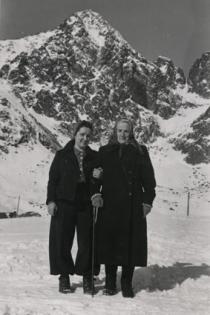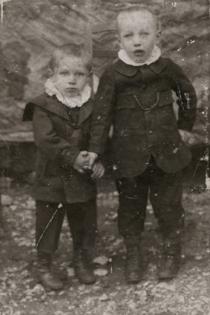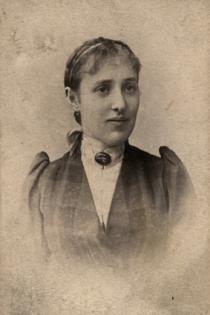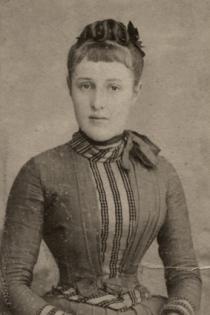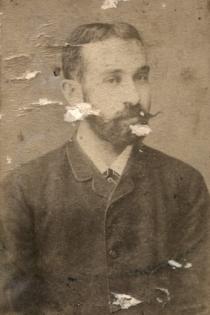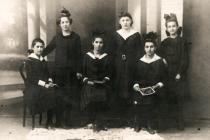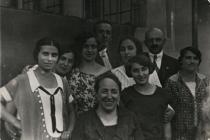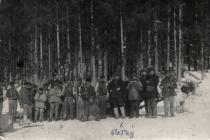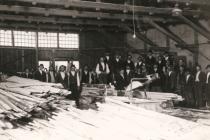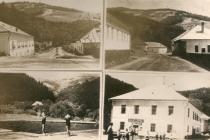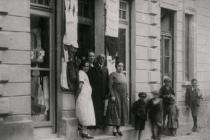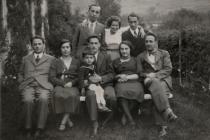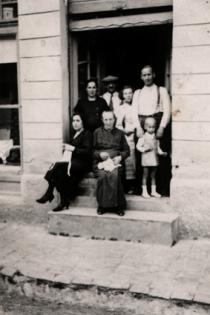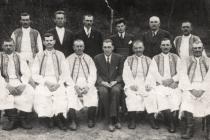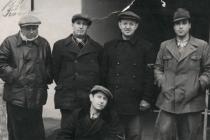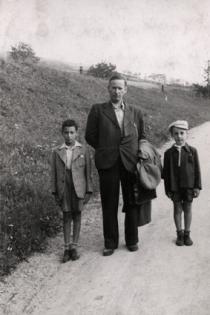
Tibor Engel
Nitra
Slovak Republic
Interviewer: Daša Slobodníková
Date of interview: February 2007
Mr. Tibor Engel is from Gemer [region], from the village of Utekac, which is mainly known for glassmaking. He survived World War II and the Slovak National Uprising 1 as a young boy. For some time he and his brother lived in illegality in Hungary. Later they hid out in the mountains and thanks to good people, and their father’s excellent nature, his eloquence, contacts and finances, their family survived this terrible time. Mr. Engel is a very educated, empathetic and communicative man. He is active in many areas, devotes himself to sport, and loves nature, literature and jazz. Despite the fact that he has lived through a great deal in his life, there’s still the spark of a mischievous boy burning in his eye.
My family background
My name is Tibor Engel, and I was born on 19th August 1936 in the village of Utekac, part of the municipality of Kokava nad Rimavicou.
I don’t remember my great-grandparents at all, and as I’m a quite late-born child, I’ve also got problems with my grandparents. My maternal grandfather, Markus Polak, was from Hungary, from Balassagyarmat I think. He died in 1936, and was around 80 years old. My grandma, Anna Polakova, was from Namestovo, from Orava [region]. She died at about the age of 80 in 1940, which means that she was born around 1860.
My paternal grandfather, Eduard Engel, was born in Zavadka nad Hronom in 1874, but then settled in Muranska Lehota, and that’s also where he died in 1944. I don’t know where my real grandmother was from. Her name was Berta Grünfeldova. She died in 1914 at the age of 34. Her birth year is likely 1880. Then my grandfather remarried, so that was my second grandmother.
Both my grandfathers were merchants. Muranska Lehota is a very small village, so Grandpa Engel was a universal merchant, a pub owner and a butcher. My grandfather in Kokava had a store with various goods, mixed goods as it was called back then. Their standard of living was relatively bearable, decent for the times. They didn’t have problems making a living. Sometimes it may have been necessary to struggle through life, especially for my grandfather in Muranska Lhota, but he managed to make a living. If we were to judge my grandparents according to the times they lived in, you could classify them as Neolog Jews 2. Basically, they were raised in an on the whole liberal fashion, no Orthodoxy 3. That carried over to my parents as well, and for all practical purposes to us, too.
My grandfather from Muranska Lehota [Engel] spoke Polish, Hungarian, German and of course Slovak. My grandfather from Kokava [Polak] spoke Slovak, but very badly, Hungarian even less, despite being from Hungary, and basically communicated in German. The language of communication in the Polak family was very interesting. Grandma Polakova belonged to Matica [a national Slovak cultural establishment with its headquarters in Martin], and also spoke Slovak with her children. Grandma spoke in very beautiful Slovak. Of course, when she and my grandfather spoke, it was in Hungarian.
Grandpa Engel died in 1944, so I more or less remember him. He wore normal, civilian clothing, and a large mustache, which I apparently used to pull on. Absolutely no one in our family ever wore traditional Jewish outfits 4.
My grandparents’ house in Kokava was one-story, and relatively large. It had a quite large commercial area. I’d say that it was around 15 by 10 meters, and of that 60 percent was a store and storage space. My grandparents’ house had four rooms. We lived in it after the war. It was their second house, because in 1911 Kokava burned down, and so my grandparents built this house between the years 1918 and 1920.
The Engels’ house in Muranska Lehota was smaller. It was more of a farmhouse, with about three rooms. I know that my grandfather had a cow, and also some sheep. There was electricity in Kokava. On the whole it was a civilized town. On both sides of the town were villages with glassmaking factories Zlatno and Utekac. The railway ran through there as well. Muranska Lehota is only a small village even now, and back then it was real backcountry. Even today, it’s only got 40 to 50 houses. Petroleum lights were used for lighting. Up in my grandparents’ attic I found a beautiful brass petroleum lamp with a tall cylinder. They used to have it in the store.
Both sets of grandparents had a garden. The garden in Kokava had around ten or twelve fruit trees of all types. When there was gardening to be done, my grandparents as a rule found someone to take care of it. They usually grew vegetables there.
I mentioned that my grandparents the Polaks had a household helper. I think that my grandparents were able to adapt to Slovak conditions quite well. They were quite well-liked. So they had a decent relationship with the help as well. In fact, when I was in Muranska Lehota a few times, people reminisced about my grandfather. After all, they wouldn’t have elected him to the town council if he wouldn’t have been able to communicate with the local community. My grandparents definitely observed only some Jewish traditions. To be specific, they observed Passover, where rituals and traditions were preserved. As far as I know, they weren’t kosher 5. It was impossible to observe the Sabbath, they were merchants, and so worked on Saturday. I’d say that they attended the synagogue in Kokava during the High Holidays.
My ancestors on the Engel side were leftists. One of my father’s brothers [Jozef Engel] even fought for a certain time, though out of spite, for Kun’s army 6. When the Czechs arrived in 1918 7, they beat him up. But because he was still very young – 16 – they didn’t shoot him, but just gave him a beating. The Engel family was quite liberal. Another uncle [Vojtech Engel], who alas also died in a concentration camp, was a socialist, you could say. They were like this because they were relatively poor. So this elicited a social conscience and way of thinking in them.
As I’ve already mentioned, my grandparents had normal to good relations with their neighbors. There weren’t any conflicts with their neighbors. All their neighbors were non-Jews. They didn’t have any special friendships with their neighbors. I’d call them proper and good relations. Simply put, they had no quarrel with each other. My grandmother from Kokava also had a strong social conscience and also helped many people. Materially as well as financially. They were merchants, and sometimes gave people things without being paid. They’d pay when they could. My grandfather from Muranska Lehota was the same.
I know of one of Grandpa Polak’s brothers who worked his way up to a relatively high position in the Hungarian civil service working for the railway. He lived in Budapest. As far as the Engel side goes, I know my grandfather had a brother. His name was Jozef and also lived in Muranska Lehota, and there was also a sister.
This is a good place for the following story. The Engels had this quality, you could call it an impatient soul. My father mentioned it once, when my grandfather was supposed to travel somewhere. There was no railway in Muranska Lehota, so he used to go catch the train in Muran, which was three kilometers away. Half an hour was plenty of time to walk from Lehota to Muran. When he was supposed to go catch the train at 5am, at 2am he was already banging on his brother Jozef’s door in Muran, for him to come to the station. As far as Grandpa Polak goes, there were stories about his poor Slovak causing many comical situations.
Growing up
I grew up in Utekac, which was a glassmaking community. In the center of the community was a glass factory, which actually supported everyone. The descendants of German colonists living in Utekac worked there. It was all German colonists, who’d come there as glassmakers. Along the street there were typical workers’ houses, colonies. It was a continuous row of one-story houses, with let’s say five or six apartments inside. The roads weren’t asphalt, but paved with stone. There were three cars in Utekac, if I’m correct. The manager of the glass factory had a car, my father had a truck, and I think there was one factory car there.
I know absolutely precisely how many Jewish inhabitants lived in Utekac back then. Our family had four members. Then there were the Grauners, who were five. There was Mr. Krivacek’s family, which was mixed. His wife was a Christian. According to Jewish laws, his three daughters couldn’t be considered Jewish [Editor’s note: Jewishness is inherited from the mother.] It’s quite hard to talk about the Jewish community in Utekac. We knew each other for many years. My parents ran a store that they rented from the glass factory. They also had good relations with the non-Jewish population. Not that they somehow considered us to be completely one of them. But on the other hand, we didn’t have any problems, like the Engels, we never had any real problems with making a living, with getting along with the rest of the community.
There was no synagogue or prayer hall in Utekac. The nearest synagogue was in Kokava nad Rimavicou, which was six kilometers away. There the Jewish community was already a bigger one. They had a rabbi and a shachter [or shochet: a ritual butcher]. Kokava also had a Jewish school. Especially after 1940, it was the only school that Jews were allowed to attend 8.
Before the war, there used to be markets in Kokava, and my mother used to go there from Utekac to sell things. She sold mixed goods. Back then, people we used to call ‘highlanders’ used to come there from far and wide, from the mountains. I remember the later, postwar markets. Some of them had stalls, and some of them sold things without a stall. They were arranged side by side. For example a counter, let’s say three meters long, a pole, covered with canvas, and then all sorts of goods spread out on it. Usually the merchants would spread themselves out on one side of the town square, or sometimes also on the other.
As for the political climate in Utekac, as far as I remember it was primarily a workers’ community. So that basically means that social democracy and communism dominated. Especially social democracy had grassroots support there. This also showed itself in the fact that most of the villagers actively participated in the Slovak National Uprising. It was a very active resistance. During the last days of August 1944, shooting was heard quite often from all sides. My parents’ store stood on this semi-square. There was always something going on there. Someone arrived, someone left. One set of partisans arrived, another left. It would also happen that people that were claiming to be partisans would arrive, and take something from everyone. Then a second set came, and arrested them for being thieves. I even remember very well, this was probably at the end of August 1944, when Allied planes were going to bomb the town of Dubova. They were flying over Utekac. They were heavy bombers with that monotonous droning, and there were many of them.
The first time I noticed anti-Semitism was in the form of minor slights from my elementary school classmates in Kokava. The conditions for this were present in many families. After 1945, it was very risky to publicly express hatred for Jews in our area. Despite this, it took place in various ways. They’d call me a Yid, for example. There was an ice cream vendor in Kokava, from the Balkans, from Montenegro, and whenever I went to buy ice cream, he’d call me ‘chifut’ [from the Turkish word Cühut, or Jew]. I never knew with it meant. Later I found out that it’s a Muslim swear-word for Jew. I was aware of these things, but they didn’t worry me much. Of course, a person realizes these things after the fact.
The first time I felt anti-Semitism in a more serious fashion wasn’t until after 1968 9, when they threw me out of school because I’d expressed my opinion regarding the arrival of the Russians 10 and of Husak 11. I was an employee by then, a teacher at the Faculty of Education in Nitra, and there the purges that took place in the schools had a clear anti-Semitic side to them as well.
My father, Julius Engel, was born on 21st November 1900 in Muranska Lehota, and died in 1976. My mother, Klara, née Polakova, was born on 3rd December 1904 in Kokava nad Rimavicou and died on 27th July 2005. My father was relatively authoritarian, and quite dynamic. More of an extrovert than an introvert. With a very friendly nature. Communicative, good-hearted, but it took me a while before I realized that. He was 166 cm tall [about 5' 5"], and relatively fair-haired, which many times helped him, that he looked quite Aryan. He loved us immensely. But the times we lived in were hard. I’d say that in this regard he crossed a certain line of tolerable parenting methods, but I can understand it. Taking into account the time that he lived in, and taking into account the worries that he had to deal with.
My mother was more of an introvert. She was my father’s ‘inferior,’ though not in a bad sense. Basically just an obedient wife. That’s how my mother was raised. I consider her to be a very good-hearted person. She was a typical woman. Not everything was the way I’d have liked it, later I said to myself many times that it would definitely not have done any harm for her to also defend me from my father, when my father ‘overdid’ it with disciplining me. She wasn’t capable of that.
My father had three years of council school and then was a merchant by trade. My mother had a primary education. My father’s mother tongue was definitely Slovak, and my mother’s tended more towards Hungarian due to my grandfather. Both of them spoke Slovak, Hungarian and German, and normally spoke to each other in three languages. They spoke Slovak with us children, and amongst themselves as well. My mother sometimes had a tendency to go off into Hungarian, but because of where we lived, my father insisted on Slovak.
My parents met in typical Jewish fashion. My father was already a relatively old bachelor, and my mother was a widow. One good aunt came along, I get the impression from Lucenec, who arranged a meeting. At that time my father was already an independent wood merchant, and it was known that my mother was a widow. So they met in 1934, and based on mutual sympathies, a wedding took place. They were married on 6th January 1935 in Rimavska Sobota. My parents dressed in a contemporary, civilian fashion. Their financial situation was acceptable, we didn’t throw money around, but neither did we want for anything.
The house in Utekac where we lived was a two-story council house. We rented it. There was a store on the ground floor, and up above it lived two families. The apartment had two rooms and a kitchen. The larder was out in the hallway. The toilet was outside the apartment as well. The furniture we had was fairly modern. It was actually furniture that my mother had gotten from my grandparents as part of her dowry. It was custom-made furniture, which then traveled along with us. I don’t know if there was running water in Utekac. There was electricity, because the glass factory had its own 110 V generator. The entire village was electrified. Our source of light was light bulbs, like normal. When we lived in Kokava nad Rimavicou, my brother and I had a German shepherd for a time.
For the whole time that my parents had their own store, we had a household helper working for us, who lived with us as well. They both had to be in the store, and we were little, so she actually took care of us children. We had several helpers. In the beginning it was one lady from Utekac. She was very nice. I got to know her after the war as well; we liked each other very much. Her name was Mrs. Migasova. The one that was with us the longest was Mrs. Pavla Vojtekova from Klenovec. She wasn’t Jewish. She was unmarried, and worked for us before the war. During the time of the Slovak State 12, she wasn’t allowed to be with us, that was unthinkable. She worked for us again from right after the war until 1950. She ran the household. I didn’t like her. While I was a good kid, she liked me and I her as well. But then I started misbehaving, so she behaved badly towards me, and then the relationship soured for some time. When she left us I was an adolescent, and it’s not easy to get along with an adolescent. Later, when we met up, it was good again.
My mother was a voracious reader. Our family used to buy decent and high-quality literature. My mother used to give me a lot of books to read, too, so we read at home. My brother and I were encouraged to read. My father read mainly the papers, and not so much literature.
My parents were almost completely non-religious. We observed only some traditions. We weren’t kosher. To this day I remember that one of my greatest joys at Passover was when we got matzot in coffee with milk. We also used to light a candle on the anniversary of someone’s death. We observed the basic traditions, but didn’t really cling to them much. I even remember, mainly from Kokava, that we used to have Christmas with all the trimmings: a tree, cabbage soup and so on. Currently my favorite holiday is Christmas, because our whole family gets together.
My mother was completely apolitical, and my father was a socialist, a leftist. Right after the war, he joined the Communist Party 13 convinced that all bad things were now at an end. In 1949, when the nationalizations began 14 and the anti-Semitic, anti-Zionist wave began, he definitely changed his attitude. My parents basically got along well with their neighbors. Our neighbors weren’t Jews. My father was communicative, and was able to get along with people very well, and you could say that on the whole he was well-liked. Our best friends were one Jewish family that lived in Kokava, Dr. Steiner’s family. My parents were friends mainly with them. They used to visit each other regularly. But they also had non-Jewish friends, and had very good relations with them.
As far as vacations and traveling go, in 1936 my father sent my mother to Grado, Italy. That was her only vacation. Business can’t take a break, and if my father would have taken a break from the store for a week, he’d have lost customers. The store had to be open. That was the basic idea of our whole existence. Aside from that, my mother went to a spa a couple of times.
My father was the oldest of the Engel siblings. Jozef, who was two years younger, worked as a salesman and died in Israel in 1983. He had two sons. Their names are Pavel and Ondrej. Both of them live in Israel. Vojtech, who was also a businessman, was another two years younger. He most likely perished in the Sobibor concentration camp 15. In 1906 Rozalia was born, who had one son. His name was Robert Glück. Robert died in Kosice in 2005, and his mother in Revuca, in 1956.
In January 1914 Mikulas came into the world, who worked as a civil servant, and also perished in a concentration camp. The year when he was born, in the summer, my grandmother died. So five children were orphaned, and he was only a few months old. My grandfather couldn’t remain like that without a woman’s helping hand, and so found himself another wife. Her name was Gizela, and she came to Muranska Lehota with two children. They then had one last child together, Elena, who was born in 1915. I’ve got the impression that she died in 1986 or 1988. She had a daughter and a son.
In the Polak family, the oldest of my mother’s siblings was Eugen, who was probably born in 1894. He died right after World War I, in 1922, of bone tuberculosis. He was a more or less active writer; a poetry collection of his has been found. The next in line was Melania, who was born in 1896; they killed her in the Auschwitz concentration camp in 1944. Next was Ernest, who was born in 1902. He was a pharmacist, and died in a concentration camp. In 1904 my mother was born, then there was another brother of hers, Pavel, who was probably born in 1906, and was a businessman. He died in 1935 I think, of quick pneumonia. The youngest was Edita. Born in 1910, she perished in a concentration camp.
After the war, my parents were mainly in touch with my mother’s brother who’d survived the concentration camp. He lived in Lucenec. We mainly very often saw my father’s second cousin who lived in Muran. We saw Rozalia’s family relatively often. After the war they lived in Revuca.
As far as my childhood goes, I’d separate it into the prewar and the postwar part. During the prewar part, I mainly played near the store in Utekac. I had one friend there, who was born on exactly same day, month and year as I. When in 1945 we moved to Kokava nad Rimavicou, I was starting Grade 4. I grew up as a village boy: fights, wandering around the area, getting into mischief. My elementary schooling is pretty weak, because I didn’t start attending school regularly until 1945. Until then all I had was a few months of Jewish school in Rimavska Sobota, which back then belonged to Hungary 16. I did Grade 1, 2 and 3 through a tutor and exams.
So it wasn’t until 1945 that I began normally attending school. I finished elementary school in Kokava nad Rimavou in 1951. From 1951 to 1955 I attended the Engineering Tech School in Zvolen, where I graduated. I studied at the Institute of Pedagogy, mathematics and physics, from 1959 to 1963, and graduated that year. From 1964 to 1972 I studied at the Faculty of Mechanical Engineering at the University of Technology in Bratislava. Then on top of that, in 1990 I did post-graduate studies at the Faculty of Mechanical Engineering at CTU in Prague.
In high school I used to hate studying, my interest in school didn’t develop until later. After graduating from high school, I decided that no more school, ever, and despite that, things changed. From what I remember, I probably liked history the best. In elementary school, I liked our history and biology teacher the best. That teacher’s name was Maria Sedmikova. Her husband taught Slovak and Music, and he used to beat us with a bow. In elementary school they used to beat us regularly; they'd bend us over a desk and whip us. I was rather afraid of that Mr. Sedmik. We were also very afraid of the geography teacher, Mr. Roman. I didn’t have a private tutor. In elementary school, there were various after-school activities. I wasn’t bad at ping pong, and began to play chess quite decently. I even played a musical instrument, the double bass. I attended piano lessons for three years.
My friends at school were non-Jews. No one in the class was a Jew except for me. There were about two or three that I got along well with. My friends outside of school were basically the same ones as in school. My friends and I used to get into mischief. We used to wander around the village, and out of naughtiness would grab some fruit from trees here or there. We used to go swimming and biking, and played soldiers.
As a child I didn’t have any special hobbies. Later, from the first year of tech school, I was into motorbikes. You could say that I like technology. As far as membership in clubs went, the Pioneer organization was more or less compulsory. Voluntarily compulsory. In tech school I was in the CSM 17, that was voluntarily compulsory as well. I attended high school in Zvolen, where I lived in private accommodations as well as at a dorm. When I was attending tech school, there was still school on Saturdays, so in Zvolen I’d always run from the school to the train at 1:30pm, and at around 4:30pm I’d be in Kokava. On Sunday it’d be back again at 4:30pm from Kokava to Zvolen. That lasted for four years, every week.
The first time I drove a car was involuntarily, against my will. I was in tech school, first year, and was doing brigade work at one farm machinery repair company where they also did cars. I sat down in a Tatra car, and as I was sitting there, some guys came and turned the ignition key. The car started, and I started and panicked. I was twisting and turning everything I could, but that didn’t help me any, and I and the car ended up in a tree. I demolished the front nicely. That was in about 1952. I got a driver’s license for small motorcycles at the age of 17. But I didn’t begin driving a car until 1970, when my wife and I bought a Trabant. The first time I rode in a train was likely still when we lived in Utekac, but I remember a train ride in Hungary in 1942, on the route from Rimavska Sobota to Budapest.
My and my brother’s [Pavel Spitzer] childhood, as is described here, was very turbulent. There’s a four year age difference between my older brother and I, and in childhood that was a big difference. In a certain sense we lived side by side, but each his own life. We didn’t begin to have a normal childhood until after the war, but there was a large age difference there, and so we had different interests. My brother’s name is Pavel, and my mother had him from her first marriage. He was born in 1932. We see each other, and the older we are, the more we like each other.
Another thing that’s necessary to mention is that in order to save us, our parents converted to the Protestant faith in 1942. After that I also attended Protestant religion for some time, until I closed the door on any sort of religion. We learned some Hungarian and German from our parents, but it wasn’t any sort of purposeful teaching. The older I am, the better I remember my knowledge of Hungarian from my two-year stay in Hungary. Apparently I’m already under the influence of ‘old-age memory.’
During the war
My parents went through a lot during the Holocaust. They survived an unbelievable amount of mental anguish. My brother and I ended up in the ghetto in Rimavska Sobota. Our father got us out of there. We had huge luck. Two months later they sent the whole ghetto to Auschwitz.
In 1941, my father got an Aryanizer for the store; he found him himself. [Aryanization: the transfer of Jewish stores, businesses, companies, etc. to the ownership of another, non-Jewish person – the Aryanizer.] His name was Jozef Valach, and he was a businessman in Valkov, by Ceske Brezovo. He was a very decent man. Thanks to him, my father could stay in Utekac and survive the war there. The friendly relations between him and my parents lasted after the war as well.
In August of 1942, they took me and my brother illegally to Rimavska Sobota, which belonged to Hungary. At that time it was a relatively small town, with several thousand inhabitants. We were at my aunt’s place. During those two months after our arrival in Rimavska Sobota, nothing better occurred to me than to stand in an open window, and sing the Slovak national anthem at the time, ‘Hej Slovaci’ [‘Hey Slovaks’].
After that performance of mine, when I belted out the Slovak anthem, but also for other reasons, our uncle and his wife along with another aunt arranged for us to get into a private children’s home in Budapest. We also experienced hunger there, because there was a food voucher system, and we were there illegally. There were no food vouchers for us. In front of me I can mainly see the huge amounts of carrot fricassee that we ate back then. You ate what you could. My father supported us as well as our uncle in Rimavska Sobota by regularly sending money with the guides that helped with illegal border crossings.
The guides, who used to cross the border at certain times would inform our parents about us. My father’s brother’s wife, Vojtecha, was also hiding in Budapest. She had our picture taken, and had some sound recordings made onto gramophone records for our parents. Our parents had a rough idea of what was going on with us. We didn’t have any information about our parents. That wasn’t talked about.
In 1943, the police caught us in Budapest. But we managed to legalize our stay in Hungary, and we returned to my uncle and aunt’s place in Rimavska Sobota [in Hungarian: Rimaszombathely]. That was in November or December. They didn’t have it easy either, because my uncle wasn’t allowed to practice his profession; he was a lawyer. So he made a living raising angora rabbits for wool. On 19th March 1944, the Germans invaded Hungary 18 and within three or four days, we were transported away. Jews from Rimavska Sobota were gathered into two ghettos. One was at the former high school in Rimavska Sobota, and the second was in a farmyard on the edge of town, which is where we ended up as well.
Back then my father did what was probably the most genial thing he’d ever accomplished. Thanks to the fact that he knew how to deal with people, and that he had certain financial resources at his disposal. Through the regional government office and via his friend Mr. Vojtech Cajchan from Hnuste, who held an important position at the Regional Office, they made up this situation that our parents were going to be tried in Slovakia for smuggling minors into Hungary. In order for them to be prosecuted, the children had to be in Slovakia as the corpus delicti during the trial. This is how Mr. Cajchan arranged it with the mayor of Rimavska Sobota, Dr. Ev. Hungarian policemen took my brother and me from the ghetto. My aunt and uncle stayed, alas.
We were taken to Rimavska Bana, on the border between Hungary and Slovakia. In Rimavska Bana a Slovak soldier, a border guard, took charge of us, and drove us to the Regional Office in Hnuste, where our father was already waiting for us. My mother always used to say that that night, before they brought us to Hnuste, our father turned gray. When I returned home, I didn’t know even a word of Slovak. To prevent any problems, we couldn’t go to Utekac right away, so they took my brother and me to our grandma’s place in Muranska Lehota. There we waited until the beginning of the Slovak National Uprising. That was the first phase of our life during the Holocaust.
In August 1944, we returned to Utekac, where our parents were living. The second phase was characterized by the fact that the Germans started occupying Slovakia, and in October 1944 the uprising was suppressed. On exactly 22nd October 1944, my father loaded our family into a truck. Also with us were the children and wife of his brother Jozef, and another of my father’s sisters-in-law, Elena, who’d in the meantime returned from Budapest. We rode the truck up into central Slovakia.
Overall, it was quite a hard trip. Right the first night, we ran into some rebel soldiers, who were also retreating. They wanted to take my father’s truck, and the commanding officer even drew his pistol on my father. It got smoothed over. The second day we went a little further on. We got to Kysuc. That day, 23rd October, the Germans were already moving along the road from Hrinov to Cierny Balog. We were in a farmhouse where several German shells landed, because the house wasn’t far from the road. Right the same day we went into the forest. My father was a woodsman, and was very good at getting by in the woods. We made a shelter out of branches, and slept in the woods.
The morning of 24th October, we went further. My father was aiming towards Brezno and the Low Tatras. As we were descending towards Cierny Balog, my father stopped at the house of one game warden, talked with him a bit, and then we kept on going. When we’d gone about two kilometers, we met some people coming from Cierny Balog and Brezno, and they told us that the Germans already had Brezno, and were now pushing towards Balog. My father turned the truck around, stopped at the warden’s, they came to some sort of agreement, and he took us into his game preserve and hid us there. The warden’s name was Jozef Vojtko. After the war he received an award from Yad Vashem 19, ‘Righteous Among the Nations’ 20.
So on 24th October we got into the care of Mr. Vojtek. He supplied us with bread and his wife even sewed some ‘kapce’ [shoes made from canvas]. We lived in three various chalets, one after the other. The first one was about 150 meters above the valley’s narrow-gauge forest train tracks. After my parents once saw a German army patrol in the valley, my father camouflaged the cabin a bit, a tall tree stood in front of it, but we didn’t stay there long after that. We moved further on, deeper into the woods. In the second cabin we were once burning wood that wasn’t dry enough, and at twilight the concentrated smoke was quite visible as it was rising up into the sky. So the Germans fired about seven shells in our direction from the road. They were aimed directly at our cabin. We had incredible luck, because the shells only hit the tops of the trees. Then my parents immediately put out the fire, and we didn’t start another one for another two days.
When the villagers began coming for Christmas trees, they discovered us. That why on 1st January 1945 we moved to the third cabin. There I also heard very loud shooting. When the Germans were retreating before the Red Army from Tisov through Cierny Balog, the partisans halted them before Balog and shot a large number of Germans. This took place on 26th or 27th January. Precisely on 1st February 1945, we returned home, to Utekac. To the same Utekac apartment that we’d left. Dishes, pots, furniture, everything was still there. The apartment hadn’t been looted. At the beginning of April we moved to my grandparents’ house in Kokava nad Rimavicou.
My parents spent the whole war in Slovakia, but it was very complicated. During the time of the transports from Slovakia, my father was for a certain time the only member of the family to remain in Utekac. He sent my mother elsewhere as well. For some time she was in hiding in Banska Bystrica. How did my father manage to save the family? In the first place, his business didn’t represent competition for anyone, because he was the only one in Utekac. His ability to communicate with people was another very important thing. The third was the he had the means and opportunity to bribe people. My father, rest his soul, always used to say that sometimes a crown is a hundred crowns, and sometimes a hundred crowns is a crown. You need to know how, when, where, to whom, and mainly to use money in the right place.
As far as family members go, my mother’s sisters Melania and her husband and Edita perished in a concentration camp. The same as their brother Ernest. On my father’s side they murdered two brothers, Vojtech and Mikulas.
After the war
In 1945 a certain pause occurred in the persecution of Jews in Czechoslovakia. But everything started up again at the beginning of the 1950s 21. But it was no longer called anti-Jewish persecution, but they were after Zionists 22. What this meant in practice was that they once again began persecuting all the Jews in the country. Emigration to Israel was definitely discussed many times at home, but in the end my father felt himself to be a Slovak, and felt at home here. So that decided it. He also didn’t believe that something like what then came could happen.
There were two waves of emigration from those around us. My cousins moved to Israel in 1949, and other friends and relatives in 1968 23. Each one had a number of reasons to decide one way or the other. So I basically don’t judge who did what. Both my parents have since died, and are buried in Bratislava. Their funeral was at a crematorium, which is in absolute contravention of the Jewish religion. It was a civil funeral.
I met my wife during my university studies. I was attending her lectures. I was this elderly student, because I didn’t continue my studies until four years after my high school graduation. After finishing high school I worked as a miner, and this occupation was greatly valued. In 1959 I applied to university, and after being accepted I also got a regional stipend, precisely because of my previous employment. In 1960 I met my wife through Russian which is what she used to lecture me in.
My wife isn’t Jewish. This was absolutely not a decisive factor for me. What decided it were human, personal qualities. This type of thing had already taken place in our family, so we didn’t surprise my parents in any way. We were married on 5th August 1961 at the Nitra Town Office. My wife’s name is Olga, née Stasova. She was born on 20th January 1935. Her mother tongue is Slovak. She’s a university lecturer in Russian literature.
My first job after graduating from high school was in the former Skoda Works in Dubnice nad Vahom. At that time they were named the K. J. Voroshilov Works. It was an arms factory. I worked there until February 1957. From February 1957 to January 1958 I worked for the Vitkovice Steel Works, at first in Vitkovice, and then in a subsidiary in Bratislava, as a designer. From January 1958 to August 1959 I worked as a miner, a brigade worker in the Novaky coal mines, in the Youth Mine in Novaky. From there I then left to go study at the Faculty of Education in Nitra.
In 1966 I began working at the Faculty of Education in Nitra as a teacher. That was my Alma Mater. In 1970 they threw me out of there for political reasons. In the meantime I’d begun distance studies at the Faculty of Mechanical Engineering. In 1971 to August 1972 I taught at elementary school around Nitra. From August 1972, after ending at STU, I got a job at a construction company in Nitra, where I worked in various positions until 1st May 1986.
In 1986 I was accepted, after winning a competition, at a branch of the Technical Standards Research Institute here in Nitra. It was the Czechoslovak Technical Standards and Quality Institute here in Nitra. The institute was named the Czechoslovak Technical Standards and Quality Institute in Bratislava, and was run directly by the Federal Technical Standards Measurement Office. The federal office was at the level of a ministry, and we were its research facility. I worked there until 1990. That year I was politically rehabilitated. I returned to the faculty and I worked there until 2003. For a certain time I was also the assistant dean of the school. I still have certain activities, I still go teach.
I think that I got along well with my students, and with my colleagues, too. When I sometime come to the department, my former colleagues are friendly. They invite me to many events put on by the department where I worked. I didn’t like going into retirement. I’m 67, but wasn’t a docent, so it was completely natural that I had to make way for someone younger. But on the other hand, it wasn’t some sort of tragedy, because I still taught for another year on contract. To this day, they still invite me to give lectures at the Methodical Education Center in Bratislava, so I survived my retirement without any sort of big trauma. Even now, I’m still not bored. I go to play tennis with my friends. I’ve got a garden where I feel very good, and go skiing with my son. I’ve got an Internet connection, which is excellent entertainment. I’ve got a little workshop in the basement, where I can work on my hobbies.
During the years 1965-1970, my colleagues and I used to go on one-day ski trips. Often we’d even have week-long ski trips with the faculty. Lately my wife and I have been going on vacation to Croatia for a week each year. We were on vacation in Hungary. In 1992 I was in Israel for 20 days visiting my cousin. We also went on vacation to Poland, to Krakow, and now, after 1990 24, I finally got to the West as well. Until then I’d never been in the West. I go on vacations only with my family and now with my wife.
I’ve got two sons; both of them were born in Nitra, in 1963 and 1965. Neither of them attended nursery school; their grandmother took care of them. Both of them attended elementary school in Nitra. The older one did high school and two years of economics. The younger one is a mechanical engineer. I tried to raise them to be proper and educated people. My sons were friends with everyone in their class. I didn’t raise them according to Jewish traditions; for starters, ours is a mixed marriage. They know what sort of family I come from. They know my roots very well. One could say that my wife and I are atheists, and that’s also how we raised our children.
I told them about what I lived through during the war, and even now we sometimes revisit various episodes from what my wife and I lived through. I summarized that period of my and my brother’s Holocaust from August 1942 to February 1945 into seven pages as a reminiscence of that time. They’re my memoirs, as well as a record of what I heard from my parents and relatives.
My older son was an extremely spirited child. At the age of 13, he took my Trabant and a classmate and they decided to go to Poland. Luckily my Trabant had more sense. The car stopped in Cetin [Maly Cetin: a town in the Nitra region]. Then one colleague of mine called me to tell me what had happened, and I had to come for the car and for my son. There were more such episodes...
I wasn’t sad when our children began leaving home. It didn’t happen all at once. We have them at home regularly, so we don’t have a feeling that our children are absent. Our older son’s university entrance interviews were stressful for us. Due to my political sanctions, he wasn’t accepted at the university where he wanted to study. Our younger one also had a very hard time getting into the Faculty of Mechanical Engineering, but that was his only chance of getting into university. He also didn’t go in the direction he would have liked. Our younger son is single. The older one has a family of his own. Both of our sons are employed. The younger one is in Bratislava during the week, and at the end of the week he comes to our place to visit.
Overall, I like books on history best. I’m very interested in the history of World War II. I read a lot of literature on the Holocaust. I basically read everything that I get my hands on. My wife and I try to live in a cultural fashion. We attend exhibitions, concerts, the theater and other cultural events. The last thing we were at was Chagall 25 in Vienna. We of course watch television. The Internet is also an excellent source of culture.
I get together with my brother, naturally. We’re in touch very often through the Internet with our second cousin who lives in Switzerland. We also use the Internet to communicate with one cousin in Israel, and correspond by mail with the other one. I’ve got a very good friend with whom I garden in [the town of] Lapas. Then there are various get-togethers, depending on whether I’m playing chess or tennis. I of course meet with my Jewish friends that live in Nitra, too. I never discuss Judaism and Jewishness with my non-Jewish friends. Quite often I discuss this subject with Mr. Alexander Potok. We’ve got quite a few themes like this of immediate concern to both of us. I don’t regard being Jewish as a religion. I perceive it and identify myself with it as an ethnicity.
I currently observe the same holidays as most people living in Slovakia. During totalitarian times, Christian holidays adapted to the times, and were presented to the public as holidays of the people. That means that for us Christmas serves mainly for us to gather with our entire Nitra family. We make utterly traditional Slovak Christmas foods, cabbage soup with sausage and mushrooms. Then we serve fried carp and potato salad.
My memories of the first half of the 1950s are very unpleasant. It was another stage in the persecution of Jews, under the guise of anti-Zionism. My father was even jailed for a week in connection with Slansky 26. In 1951 my mother was preparing to take me to Prague. My health wasn’t completely in order. In the store that my father managed worked the wife of the Kokava police chief. They were probably the informers who construed a supposed contact with Slansky out of my mother’s planned departure for Prague. One Saturday, when I was a tech school student, the secret police 27 came, searched our house, and took my father with them. The next Saturday, when I came home from school, my father came home. He never wanted to tell me what he’d experienced. But apparently it wasn’t easy, all I know is that they wouldn’t allow him to lie down. They forced him to stand on one leg. They didn’t shut off the light in the cell and so on. After a week they released him.
In 1965 I joined the Party. A political thaw was beginning, and I believed that one could survive there. In a certain fashion I joined out of belief, not to mention there being also a bit of careerism in it. But it didn’t last long for me. By 1969 I was already thrown out; I was disobedient, rebellious.
I perceived the arrival of democracy in Czechoslovakia after 1989 as a very positive thing. The most important thing for me was that the barrier between Israel and Slovakia completely disappeared, and at last I could communicate normally with my relatives. The border with the West also opened up. After the fall of Communism, I felt and also feel much freer. Currently I’m a member of the Jewish religious community in Nitra. My old friends are there, whom I get along with very well.
Glossary:
1 Slovak Uprising
At Christmas 1943 the Slovak National Council was formed, consisting of various oppositional groups (communists, social democrats, agrarians etc.). Their aim was to fight the Slovak fascist state. The uprising broke out in Banska Bystrica, central Slovakia, on 29th August 1944. On 18th October the Germans launched an offensive. A large part of the regular Slovak army joined the uprising and the Soviet Army also joined in. Nevertheless the Germans put down the riot and occupied Banska Bystrica on 27th October, but weren't able to stop the partisan activities. As the Soviet army was drawing closer many of the Slovak partisans joined them in Eastern Slovakia under either Soviet or Slovak command.2 Neolog Jewry
Following a Congress in 1868/69 in Budapest, where the Jewish community was supposed to discuss several issues on which the opinion of the traditionalists and the modernizers differed and which aimed at uniting Hungarian Jews, Hungarian Jewry was officially split into two (later three) communities, which all built up their own national community network. The Neologs were the modernizers, who opposed the Orthodox on various questions. The third group, the sop-called Status Quo Ante advocated that the Jewish community was maintained the same as before the 1868/69 Congress.3 Orthodox communities
The traditionalist Jewish communities founded their own Orthodox organizations after the Universal Meeting in 1868-1869.They organized their life according to Judaist principles and opposed to assimilative aspirations. The community leaders were the rabbis. The statute of their communities was sanctioned by the king in 1871. In the western part of Hungary the communities of the German and Slovakian immigrants' descendants were formed according to the Western Orthodox principles. At the same time in the East, among the Jews of Galician origins the 'eastern' type of Orthodoxy was formed; there the Hassidism prevailed. In time the Western Orthodoxy also spread over to the eastern part of Hungary. In 1896, there were 294 Orthodox mother-communities and 1,001 subsidiary communities registered all over Hungary, mainly in Transylvania and in the north-eastern part of the country,. In 1930, the 136 mother-communities and 300 subsidiary communities made up 30.4 percent of all Hungarian Jews. This number increased to 535 Orthodox communities in 1944, including 242,059 believers (46 percent).4 Orthodox Jewish dress: Main characteristics of observant Jewish appearance and dresses: men wear a cap or hat while women wear a shawl (the latter is obligatory in case of married women only). The most peculiar skull-cap is called kippah (other name: yarmulkah; kapedli in Yiddish), worn by men when they leave the house, reminding them of the presence of God and thus providing spiritual protection and safety. Orthodox Jewish women had their hair shaved and wore a wig. In addition, Orthodox Jewish men wear a tallit (Hebrew term; talles in Yiddish) [prayer shawl] and its accessories all day long under their clothes but not directly on their body. Wearing payes (Yiddish term; payot in Hebrew) [long sideburns] is linked with the relevant prohibition in the Torah [shaving or trimming the beard as well as the hair around the head was forbidden]. The above habits originate from the Torah and the Shulchan Arukh. Other pieces of dresses, the kaftan [Russian, later Polish wear] among others, thought to be typical, are an imitation. According to non-Jews these characterize the Jews while they are not compulsory for the Jews.
5 Kashrut in eating habits: Kashrut means ritual behavior. A term indicating the religious validity of some object or article according to Jewish law, mainly in the case of foodstuffs. Biblical law dictates which living creatures are allowed to be eaten. The use of blood is strictly forbidden. The method of slaughter is prescribed, the so-called shechitah. The main rule of kashrut is the prohibition of eating dairy and meat products at the same time, even when they weren't cooked together. The time interval between eating foods differs. On the territory of Slovakia six hours must pass between the eating of a meat and dairy product. In the opposite case, when a dairy product is eaten first and then a meat product, the time interval is different. In some Jewish communities it is sufficient to wash out one's mouth with water. The longest time interval was three hours - for example in Orthodox communities in Southwestern Slovakia.
6 Kun, Bela (1886-1938)
Hungarian communist politician of Jewish origin. He became a member of the Social Democratic Party in 1902 as a secondary school student, after which he worked as a journalist. He was drafted in 1914 and two years later fell into Russian captivity. In 1917 he joined the Bolshevik Party in the prison camp of Tomsk and after his release he was acquainted with the communist leaders (Lenin, Buharin) of Russia. In November 1918 together with Ernoe Por, Tibor Szamuely and others, he formed the Hungarian branch of the Bolshevik Party. After returning to Hungary he organized the statutory meeting of the HCP. When Count Karolyi resigned in March 1919, he headed the new Hungarian Soviet Republic, the world's second communist government. After the regime collapsed he fled to Vienna and then Russia. In 1921 he became a leader of the Comintern. In 1936 he was removed from his post as a result of a show trial, then arrested and later probably executed, though the circumstances and the exact date of his death remain unclear.7 First Czechoslovak Republic (1918-1938)
The First Czechoslovak Republic was created after the collapse of the Austro-Hungarian Monarchy following World War I. The union of the Czech lands and Slovakia was officially proclaimed in Prague in 1918, and formally recognized by the Treaty of St. Germain in 1919. Ruthenia was added by the Treaty of Trianon in 1920. Czechoslovakia inherited the greater part of the industries of the Austro-Hungarian Monarchy and the new government carried out an extensive land reform, as a result of which the living conditions of the peasantry increasingly improved. However, the constitution of 1920 set up a highly centralized state and failed to take into account the issue of national minorities, and thus internal political life was dominated by the struggle of national minorities (especially the Hungarians and the Germans) against Czech rule. In foreign policy Czechoslovakia kept close contacts with France and initiated the foundation of the Little Entente in 1921.8 Jewish Codex
Order no. 198 of the Slovakian government, issued in September 1941, on the legal status of the Jews, went down in history as Jewish Codex. Based on the Nuremberg Laws, it was one of the most stringent and inhuman anti-Jewish laws all over Europe. It paraphrased the Jewish issue on a racial basis, religious considerations were fading into the background; categories of Jew, Half Jew, moreover 'Mixture' were specified by it. The majority of the 270 paragraphs dealt with the transfer of Jewish property (so-called Aryanizing; replacing Jews by non-Jews) and the exclusion of Jews from economic, political and public life.9 Political changes in 1969: Following the Prague Spring of 1968, which was suppressed by armies of the Soviet Union and its satellite states, a program of 'normalization' was initiated. Normalization meant the restoration of continuity with the pre-reform period and it entailed thoroughgoing political repression and the return to ideological conformity. Top levels of government, the leadership of social organizations and the party organization were purged of all reformist elements. Publishing houses and film studios were placed under new direction. Censorship was strictly imposed, and a campaign of militant atheism was organized. A new government was set up at the beginning of 1970, and, later that year, Czechoslovakia and the Soviet Union signed the Treaty of Friendship, Cooperation and Mutual Assistance, which incorporated the principle of limited sovereignty. Soviet troops remained stationed in Czechoslovakia and Soviet advisers supervised the functioning of the Ministry of Interior and the security apparatus.
10 Warsaw Pact Occupation of Czechoslovakia: The liberalization of the communist regime in Czechoslovakia during the Prague Spring (1967-68) went further than anywhere else in the Soviet block countries. These new developments were perceived by the conservative Soviet communist leadership as intolerable heresy dangerous for Soviet political supremacy in the region. Moscow decided to put a radical end to the chain of events and with the participation of four other Warsaw Pact countries (Poland, East Germany, Hungary and Bulgaria) ran over Czechoslovakia in August, 1968.
11 Husak, Gustav (1913–1991): Entered into politics already in the 1930s as a member of the Communist Party. Drew attention to himself in 1944, during preparations for and course of the Slovak National Uprising. After the war he filled numerous party positions, but of special importance was his chairmanship of the Executive Committee during the years 1946 to 1950. His activities in this area were aimed against the Democratic Party, the most influential force in Slovakia. In 1951 he was arrested, convicted of bourgeois nationalism and in April 1954 sentenced to life imprisonment. Long years of imprisonment, during which he acted courageously and which didn't end until 1960, neither broke Husak's belief in Communism, nor his desire to excel. He used the relaxing of conditions at the beginning of 1968 for a vigorous return to political life. Because he had gained great confidence and support in Slovakia, on the wishes of Moscow he replaced Alexander Dubcek in the function of First Secretary of the Czechoslovak Communist Party. More and more he gave way to Soviet pressure and approved mass purges in the Communist Party. When he was elected president on 29th May 1975, the situation in the country was seemingly calm. The Communist Party leaders were under the impression that given material sufficiency, people will reconcile themselves with a lack of political and intellectual freedom and a worsening environment. In the second half of the 1980s social crises deepened, multiplied by developments in the Soviet Union. Husak had likely imagined the end of his political career differently. In December 1987 he resigned from his position as General Secretary of the Communist Party, and on 10th December 1989 as a result of the revolutionary events also abdicated from the presidency. Symbolically, this happened on Human Rights Day, and immediately after he was forced to appoint a government of 'national reconciliation.' The foundering of his political career quickened his physical end. Right before his death he reconciled himself with the Catholic Church. He died on 18th February 1991 in Bratislava.
12 Slovak State (1939-1945)
Czechoslovakia, which was created after the disintegration of Austria-Hungary, lasted until it was broken up by the Munich Pact of 1938; Slovakia became a separate (autonomous) republic on 6th October 1938 with Jozef Tiso as Slovak PM. Becoming suspicious of the Slovakian moves to gain independence, the Prague government applied martial law and deposed Tiso at the beginning of March 1939, replacing him with Karol Sidor. Slovakian personalities appealed to Hitler, who used this appeal as a pretext for making Bohemia, Moravia and Silesia a German protectorate. On 14th March 1939 the Slovak Diet declared the independence of Slovakia, which in fact was a nominal one, tightly controlled by Nazi Germany.13 Communist Party of Czechoslovakia (KSC): Founded in 1921 following a split from the Social Democratic Party, it was banned under the Nazi occupation. It was only after Soviet Russia entered World War II that the Party developed resistance activity in the Protectorate of Bohemia and Moravia; because of this, it gained a certain degree of popularity with the general public after 1945. After the communist coup in 1948, the Party had sole power in Czechoslovakia for over 40 years. The 1950s were marked by party purges and a war against the 'enemy within'. A rift in the Party led to a relaxing of control during the Prague Spring starting in 1967, which came to an end with the occupation of Czechoslovakia by Soviet and allied troops in 1968 and was followed by a period of normalization. The communist rule came to an end after the Velvet Revolution of November 1989.
14 Nationalization in Czechoslovakia: The goal of nationalization was to put privately-owned means of production and private property into public control and into the hands of the Socialist state. The attempts to change property relations after WWI (1918-1921) were unsuccessful. Directly after WWII, already by May 1945, the heads of state took over possession of the collaborators' (that is, Hungarian and German) property. In July 1945, members of the Communist Party before the National Front openly called for the nationalization of banks, financial institutions, insurance companies and industrial enterprises, the execution of which fell to the Nationalization Central Committee. The first decree for nationalization was signed 11th August 1945 by the Republic President. This decree affected agricultural production, the film industry and foreign trade. Members of the Communist Party fought representatives of the National Socialist Party and the Democratic Party for further expansion of the process of nationalization, which resulted in the president signing four new decrees on 24th October, barely two months after taking office. These called for nationalization of the mining industry companies and industrial plants, the food industry plants, as well as joint-stock companies, banks and life insurance companies. The nationalization established Czechoslovakia's financial development, and shaped the 'Socialist financial sphere.' Despite this, significantly valuable property disappeared from companies in public ownership into the private and foreign trade network. Because of this, the activist committee of the trade unions called for further nationalizations on 22nd February 1948. This process was stopped in Czechoslovakia by new laws of the National Assembly in April 1948, which were passed that December.
15 Sobibor
A Nazi death camp located in the Lublin district of the General Government. It operated since May 1942. Jews from the Lublin region and eastern Galicia were transported here, as well as from Lithuania, Belarus, Czechoslovakia, and Western Europe. The victims were killed in gas chambers with carbon monoxide from exhaust fumes and later buried in mass graves; at the end of 1942 the bodies were exhumed and incinerated. The commandant of the camp was Franz Stangl. The permanent crew consisted of 30 SS-men and 120 guards, members of the German and Ukrainian auxiliary forces. Approximately 1,000 Jewish inmates were kept for maintenance works in the camp: operating the gas chambers and crematoria, sorting the property of the victims. An estimated 250,000 Jews were murdered in Sobibor. In the summer of 1943 an underground organization was founded among the functional inmates, led by Leon Feldhandler and Aleksander Peczerski. They organized a rebellion which broke out on 14th October 1943. Killing a number of guards enabled 300 (out of the total 600) prisoners to escape. About 50 of them survived the war. Soon after the rebellion the Germans liquidated the camp.16 First Vienna Decision
On 2nd November 1938 a German-Italian international committee in Vienna obliged Czechoslovakia to surrender much of the southern Slovakian territories that were inhabited mainly by Hungarians. The cities of Kassa (Kosice), Komarom (Komarno), Ersekujvar (Nove Zamky), Ungvar (Uzhorod) and Munkacs (Mukacevo), all in all 11.927 km? of land, and a population of 1.6 million people became part of Hungary. According to the Hungarian census in 1941 84% of the people in the annexed lands were Hungarian-speaking.17 Czechoslovak Youth Association (CSM)
Founded in 1949, it was a mass youth organization in the Czechoslovak Republic, led by the Communist Party of Czechoslovakia. It was dissolved in 1968 but reestablished in April 1969 by the Communist Party as the Socialist Youth Association and was only dissolved in 1989.18 19th March 1944
Hitler found out about Prime Minister Miklos Kallay's and Governor Miklos Horthy's attempts to make peace with the west, and by the end of 1943 worked out the plans, code-named 'Margarethe I. and II.', for the German invasion of Hungary. In early March 1944, Hitler, fearing a possible Anglo-American occupation of Hungary, gave orders to German forces to march into the country. On 18th March, he met Horthy in Klessheim, Austria and tried to convince him to accept the German steps, and for the signing of a declaration in which the Hungarians would call for the occupation by German troops. Horthy was not willing to do this, but promised he would stay in his position and would name a German puppet government in place of Kallay's. On 19th March, the Germans occupied Hungary without resistance. The ex-ambassador to Berlin, Dome Sztojay, became new prime minister, who - though nominally responsible to Horthy - in fact, reconciled his politics with Edmund Veesenmayer, the newly arrived delegate of the Reich.19 Yad Vashem
This museum, founded in 1953 in Jerusalem, honors both Holocaust martyrs and 'the Righteous Among the Nations', non-Jewish rescuers who have been recognized for their 'compassion, courage and morality.'20 Righteous Among the Nations: A medal and honorary title awarded to people who during the Holocaust selflessly and for humanitarian reasons helped Jews. It was instituted in 1953. Awarded by a special commission headed by a justice of the Israeli Supreme Court, which works in the Yad Vashem National Remembrance Institute in Jerusalem. During the ceremony the persons recognized receive a diploma and a medal with the inscription "Whoever saves one life, saves the entire world" and plant a tree in the Avenue of the Righteous on the Remembrance Hill in Jerusalem, which is marked with plaques bearing their names. Since 1985 the Righteous receive honorary citizenship of Israel. So far over 20,000 people have been distinguished with the title, including almost 6,000 Poles.
21 Slansky trial: In the years 1948-1949 the Czechoslovak government together with the Soviet Union strongly supported the idea of the founding of a new state, Israel. Despite all efforts, Stalin's politics never found fertile ground in Israel; therefore the Arab states became objects of his interest. In the first place the Communists had to allay suspicions that they had supplied the Jewish state with arms. The Soviet leadership announced that arms shipments to Israel had been arranged by Zionists in Czechoslovakia. The times required that every Jew in Czechoslovakia be automatically considered a Zionist and cosmopolitan. In 1951 on the basis of a show trial, 14 defendants (eleven of them were Jews) with Rudolf Slansky, First Secretary of the Communist Party at the head were convicted. Eleven of the accused got the death penalty; three were sentenced to life imprisonment. The executions were carried out on 3rd December 1952. The Communist Party later finally admitted its mistakes in carrying out the trial and all those sentenced were socially and legally rehabilitated in 1963.
22 Zionism
A movement defending and supporting the idea of a sovereign and independent Jewish state, and the return of the Jewish nation to the home of their ancestors, Eretz Israel - the Israeli homeland. The final impetus towards a modern return to Zion was given by the show trial of Alfred Dreyfuss, who in 1894 was unjustly sentenced for espionage during a wave of anti-Jewish feeling that had gripped France. The events prompted Dr. Theodor Herzl (1860-1904) to draft a plan of political Zionism in the tract 'Der Judenstaat' ('The Jewish State', 1896), which led to the holding of the first Zionist congress in Basel (1897) and the founding of the World Zionist Organization (WZO). The WZO accepted the Zionist emblem and flag (Magen David), hymn (Hatikvah) and an action program.23 Prague Spring: A period of democratic reforms in Czechoslovakia, from January to August 1968. Reformatory politicians were secretly elected to leading functions of the Communist Party of Czechoslovakia (KSC). Josef Smrkovsky became president of the National Assembly, and Oldrich Cernik became the Prime Minister. Connected with the reformist efforts was also an important figure on the Czechoslovak political scene, Alexander Dubcek, General Secretary of the KSC Central Committee (UV KSC). In April 1968 the UV KSC adopted the party's Action Program, which was meant to show the new path to socialism. It promised fundamental economic and political reforms. On 21st March 1968, at a meeting of representatives of the USSR, Hungary, Poland, Bulgaria, East Germany and Czechoslovakia in Dresden, Germany, the Czechoslovaks were notified that the course of events in their country was not to the liking of the remaining conference participants, and that they should implement appropriate measures. In July 1968 a meeting in Warsaw took place, where the reformist efforts in Czechoslovakia were designated as "counter-revolutionary." The invasion of the USSR and Warsaw Pact armed forces on the night of 20th August 1968, and the signing of the so-called Moscow Protocol ended the process of democratization, and the Normalization period began.
24 Velvet Revolution: Also known as November Events, this term is used for the period between 17th November and 29th December 1989, which resulted in the downfall of the Czechoslovak communist regime. A non-violent political revolution in Czechoslovakia that meant the transition from Communist dictatorship to democracy. The Velvet Revolution began with a police attack against Prague students on 17th November 1989. That same month the citizen's democratic movement Civic Forum (OF) in Czech and Public Against Violence (VPN) in Slovakia were formed. On 10th December a government of National Reconciliation was established, which started to realize democratic reforms. On 29th December Vaclav Havel was elected president. In June 1990 the first democratic elections since 1948 took place.
25 Chagall, Marc (1889-1985): Russian-born French painter. Since Marc Chagall survived two world wars and the Revolution of 1917 he increasingly introduced social and religious elements into his art.
26 Slansky, Rudolf (1901-1952): Czech politician, member of the Communist Party from 1921 and Secretary-General of the Czechoslovak Communist Party from 1945-1951. After World War II he was one of the leaders of the totalitarian regime. Arrested on false charges he was sentenced to death in the so-called Slansky trial in November 1952 and hanged.
